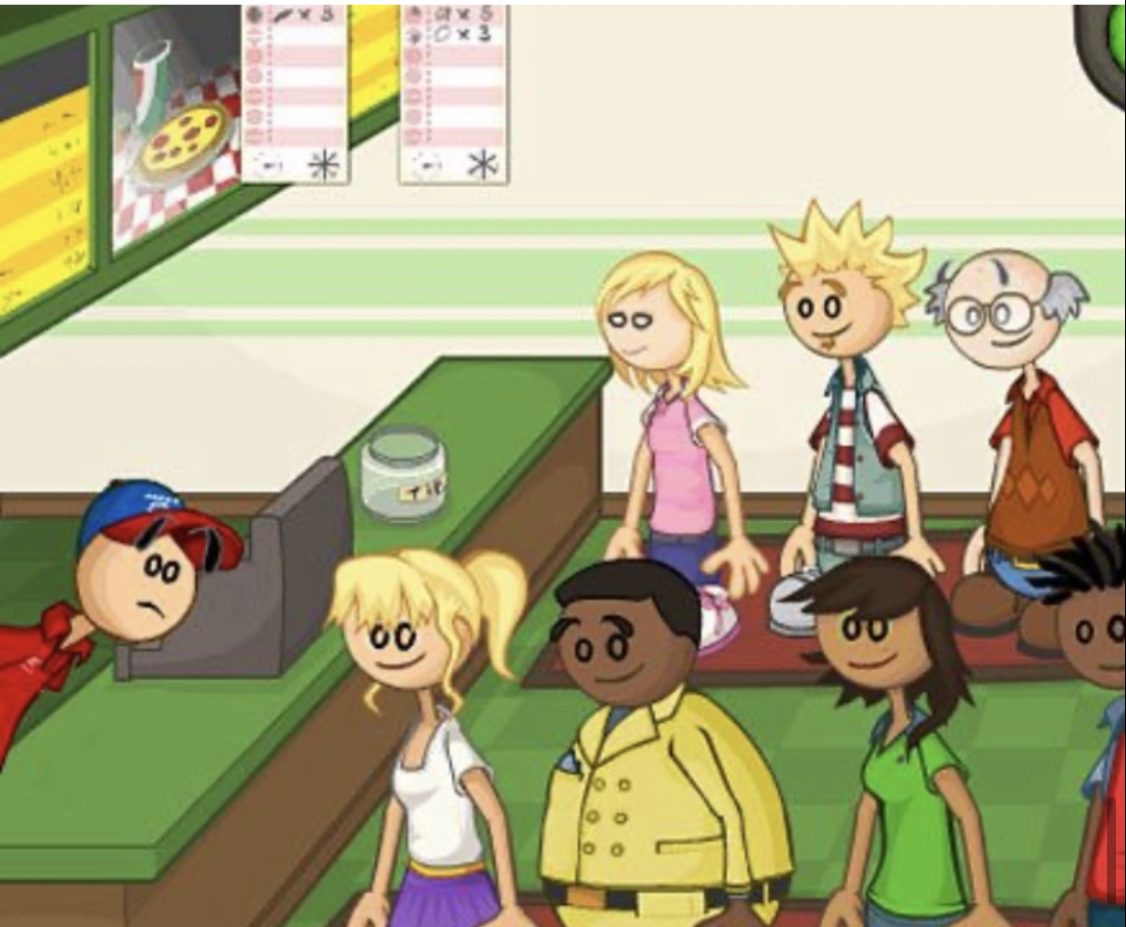It’s 2014. You sit in front of a boxy beige computer. The air smells like EXPO markers as you listen to the chatter around you. You don’t partake in the conversation—you have a job to do. With your eyes intently glued to your computer screen, you produce taco after taco, perfecting every detail from the char on the meat to the precise placement of the sour cream. Suddenly, you feel your stomach drop as a bitter-looking woman in a navy suit orders a taco. Her request is elaborate, but nothing you cannot handle. Nevertheless, this woman is presented as a challenge: a picky eater who will not accept sloppy work. Determined to make it as neat and perfect as possible, you zero in on her taco. Unfortunately, when you present your finished product to the customer, she tips you a meager $0.16. You finish the day with a middling score and a final total of tips that leaves much to be desired.
In the universe of the “Papa’s” games, boasting well-loved classics such as Papa’s Freezeria and Papa’s Taco Mia, Papa Louie reigns supreme. Donning a chef’s hat taller than he is, Papa sways many unsuspecting hirees to work in his various establishments. Beginning with Papa’s Pizzeria, where an unprepared delivery boy must suddenly run the restaurant as the sole employee, Papa Louie has placed immense responsibility on every single worker. Being the only worker of a popular local restaurant could be worth it for the wages. Papa Louie evidently doesn’t feel the need to entice potential employees with a decent salary; his workers survive only off of tips. Papa is nothing short of a conman, manipulating kneeless workers into running his multicultural food empire.
You might think “it’s just a game, none of this is that deep”. Possibly—the Papa’s games exist in a fictional world irrelevant in our everyday lives. Or so it may seem. In their world, Papa Louie is the quintessential businessman, owning profitable restaurants throughout his imagined country. Comparable to our real-life fast food titans, the questionable business ethics touted by Papa Louie eerily reflect our modern workforce. Papa Louie’s methods of paying his employees clearly exemplify wage theft. An epidemic that shows no signs of ending, wage theft has allowed corporations such as Walmart and McDonald’s to steal hundreds of thousands of dollars from vulnerable employees. In 2013, a group of McDonald’s employees filed a lawsuit demanding reparations for wage theft and hazardous working conditions. It wasn’t until 2019 that the state of California required the company to fork over $26 million to their employees. The amount of time it took for the plaintiffs to receive compensation is upsetting, yet many companies barely acknowledge the abuse workers face.
Immigrants are one of the most significant victims of exploitation at the hands of large companies. They are often forced to work off the clock, and employers are more likely to pay them less than minimum wage. According to the Center for Public Integrity, over 16,000 employers have gotten away with wage theft, resulting in $20.3 million stolen between 2005 and 2020. 16,000 Papa Louie-esque establishments have wrapped the United States Labor Department around their fingers. Repeat offenders are rarely penalized, with only around one in four facing federal punishment. Even if companies are reprimanded for wage theft, the US Labor Department often lets them off the hook without forcing them to reimburse impacted employees. All of this provides insufficient incentive for companies to follow ethical guidelines.
Even if businesses do pay minimum wage, employees will still suffer; the minimum wage is barely enough to live off of. The standard minimum is $7.25, and while many states have raised this figure, minimum wage workers everywhere struggle to make ends meet. The minimum wage has not been livable since the 1960s, yet little has been done to support struggling workers. The push to increase pay is primarily a grassroots effort. While Democrats have advocated for greater wages, little has been accomplished in the slow-moving legislation. Workers have often staged walkouts and protests in order to draw attention to the issue, but the nature of minimum-wage jobs puts workers in a difficult position. Varied work schedules make it difficult to work two jobs, attend classes, or do anything that takes a significant chunk of one’s day. The combination of blatant mistreatment and continued wage theft emphasizes that large corporations refuse to see their employees as human, yet their company would collapse without the labor of minimum wage workers.
Think of the frustration you felt as a young person playing a Papa’s game and receiving minimal tips. Imagine the intensity of your emotions if the food, money, and restaurant were real. Millions across the country are swindled and exploited by real-life ‘Papa Louie’s, forced to work long hours just to have what little money they make stolen by corporations. Corporations run the world, and they are able to do so primarily through abuse and questionable morals. Their immense power makes for a seemingly hopeless situation. However, with an understanding of labor exploitation and wage theft, demonstrated in the Papa’s games, we can work together to stop fueling the fat cats that control the economy.
Featured Image Source: PlanetozKids






Comments are closed.